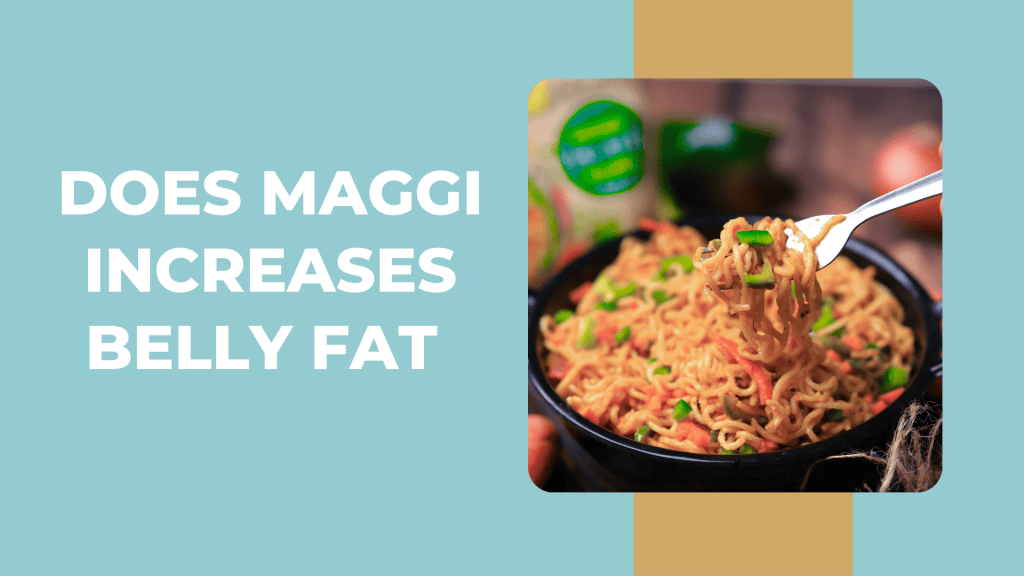M+aggi is a low calorie food however it is made up of maida which is rich in trans fat and low in fiber, protein and other essential nutrients. The popular snack of maggi is also rich in processed sugar which increases the risk of type 2 diabetes and also leads to increased hunger pangs. The content of sodium is also high in maggi and several research have linked high sodium consumption with increased visceral or belly fat. It can also lead to increased blood pressure which can give way to hypertension and risks of heart diseases or stroke. Continue reading to know further on how does maggi increases belly fat.
Does Maggi increases Belly Fat?
Yes, maggi can increase belly fat if consumed in unhealthy amounts as it contains refined carbohydrates which get easily digested and also leads to blood sugar spike. This can give way to hunger pangs and cause overindulgence ultimately contributing to unnecessary weight gain. However, eating Maggi occasionally as part of a balanced diet is unlikely to directly cause belly fat. The key lies in moderation and ensuring that overall calorie intake is controlled while maintaining a diverse intake of nutritious foods to support overall health and weight management. For sustainable weight loss under the guidance of expert nutritionists, one can Buy Weightloss diet plan.
Should you eat Maggi during Weight Loss?
Although low in calories maggi noodles are also low in nutrients and high in refined carbohydrates which can lead to blood sugar spikes and increase hunger pangs. Maggi might not be a good fit for weight loss as it is also substantially low in dietary fibers and lacks several essential vitamins and minerals. Moreover, the food also contains certain chemicals that supports its long shelf life as well as improves flavour. One can eat maggi once or twice in a month during their weight loss journey by enhancing its nutritional content through addition of veggies and spices. However, it should not be a part of one’s regular meal plan as that may enhance the risk of diabetes and weight gain. This can help you find answer to Is Maggi good for weight loss?
Pros of eating Maggi?
Below mentioned are the pros of eating maggi-
1. Quick and convenient
Maggi can be quickly prepared in mere minutes and its method of preparation is also conveniently simple. For busy professionals or people with hectic lifestyles, maggi can be an instant boost requiring minimal efforts and it is also fortified with iodine, iron, and vitamin A which may assist in preventing anaemia and night blindness. Maggi can be made further delightful by including several nutrient rich and low calorie foods.
2. Satiates hunger
Maggi often acts as a comfort food for people and since it’s quick to prepare, it can be consumed for satiating hunger. When mixed with veggies, eggs or lean meat, maggi can help stave off hunger for prolonged duration and also make up for the nutritional deficiency of the noodles.
3. Replenishes energy
Maggi majorly consists of wheat flour, palm oil, several sauces and certain veggies. This helps in providing vitamins, fats, protein or minerals water compounds to the body which can assist one’s nutrition and enhance energy levels. Thus, during shortage of time, maggi can be a quick energetic boost to the body.
4. Versatile
Maggi is versatile because it can be customized in countless ways to suit different tastes and nutritional needs. While the basic preparation involves just noodles and seasoning, many people enhance it by adding a variety of ingredients like vegetables, eggs, cheese, or proteins like chicken and tofu. It can be adapted into different recipes, such as stir-fries, soups, or even as a base for more complex dishes like Maggi sandwiches or fritters. Maggi can be included in one’s Low budget diet plan for weight loss.
Cons of eating Maggi?
Maggi increases belly fat because of the below mentioned cons-
1. High in refined carbs
Maggi is high in refined flour and oil and neither of them contains any essential nutrients but are rather high in calories and refined carbs. They have a high glycemic index which makes them get digested faster and causes the blood sugar and insulin levels to increase. This can heighten the risk of type 2 diabetes and also cause hunger pangs and craving which can further lead to obesity or being overweight. Excess consumption of refined carbs has also been linked to damaged metabolic rate and metabolic diseases. You may want to figure out, Is Vermicelli good for weight loss?
2. High sodium content
A 100 gm of maggi contains about 1.3 g of sodium which is quite a high amount and can pose serious threats to one’s health. High sodium content can cause high blood pressure that can also increase the risk of heart disease, stroke, and kidney disease. Excessive salt intake is also linked to frequent sleep awakenings and increases the risk of snoring and sleep apnea.
3. Low nutritional value
Maggi is low in nutrients, primarily because it is made from refined flour (maida), which lacks essential vitamins, minerals, and fiber. While it may provide quick energy due to its carbohydrate content, it does little to contribute to a balanced diet. The seasoning packet is often high in sodium and artificial additives but doesn’t offer significant nutritional benefits. Unlike whole foods, which provide a range of nutrients, Maggi offers minimal protein, healthy fats, or micronutrients like vitamins and minerals necessary for overall health.
4. Rich in unhealthy fats
The content of maggi is rich in trans fat which is the unhealthiest fats and can cause several health complications. They can increase the levels of bad cholesterol and lower good cholesterol which can build up cholesterol in your arteries and enhance the risk of heart diseases and stroke. Trans fat is also known to increase insulin resistance, spiking the risk of type 2 diabetes and also causing obesity.
Nutritional Breakdown of Maggi
A 100-gram serving of Maggi typically contains around 142 calories, with the majority of these calories coming from refined carbohydrates. This portion includes approximately 50-60 grams of carbs, mostly from refined flour (maida), which lacks fiber and essential nutrients. The protein content is modest, around 7-8 grams, while the fat content ranges from 12-15 grams, including unhealthy saturated fats. The sodium levels are high, often exceeding 700 milligrams per 100 grams, which is significant relative to daily intake recommendations. In terms of micronutrients, Maggi offers minimal vitamins and minerals, making it low in overall nutritional value despite its ability to satisfy hunger quickly.
| Serving Size | Calories | Carbs | Protein | Fat | Sodium |
| 100 gm | 142 kcal | 50 g | 7 g | 12 g | 700 mg |
Expert Review on Does Maggi increases Belly Fat
Dr. Amit Kochar is a nutritionist and on the question of does maggi increases belly fat, he says that the content of maggi is rich in trans fat and lacks nutrients which can increase belly fat. One can consume maggi as a cheat meal once or twice in a month by mixing it up with several veggies and lean proteins. However, regular consumption of the maggi increases belly fat and leads to health complications such as type 2 diabetes, heart diseases, obesity, high blood pressure, stroke or more.
References
“CASE STUDY ON “THE MAGGI EFFECT: NESTLÉ’S PUBLIC RELATIONS NIGHTMARE.”” n.d. School of Business Studies, University of Kashmir. Accessed August 27, 2024. https://deanbs.uok.edu.in/Files/6d8be055-fc07-4110-8b8a-48477e9b960a/Journal/2e36b2ec-d757-4d1e-8607-8daa9351716f.pdf.
Cornelsen, Laura. n.d. “Persistent consumer response to a nationwide food safety recall in urban India.” NCBI. Accessed August 27, 2024. https://www.ncbi.nlm.nih.gov/pmc/articles/PMC9537021/.
Reinagel, Monica. 2018. “The Surprising Link between Salt and Weight Gain.” Scientific American. https://www.scientificamerican.com/article/the-surprising-link-between-salt-and-weight-gain/.
FAQs
1. Will Maggi make the person fat or thin?
Maggi increases belly fat and can lead to fat gain as it is made of refined flour and it also contains hydrogenated oil which is bad for health.
2. Do noodles increase belly fat?
Regular consumption of noodles like maggi increases belly fat and causes metabolic diseases, high blood pressure, heart problems and obesity.
3.Does Maggi affect weight loss?
Maggi contains very few calories thus it can be consumed once in a while without increasing the calorie intake. However, its regular consumption can pose a threat to your weight loss journey causing you to gain weight.
4. How to digest Maggi faster?
Consumption of fluids before and after a meal helps in digestion as it keeps you hydrated and also allows breaking down of food better. One should stay hydrated as it effectively assists in saliva production.









